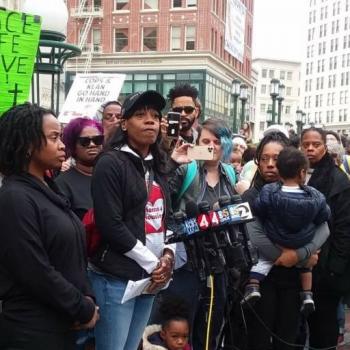Deadly Sins Sermon Series, 1 out of 7 — 10/16/2010
Text: selections from Jonah
In the late nineties at the University of Virginia, we had a hellfire preacher who would come out every fall to verbally abuse people in the amphitheater. He sent all of us to hell, Christians and non-Christians alike. He would always wear a suit that was very wrinkled and sometimes soaking wet. He usually drew quite a crowd. The frat-boys loved him and did their best to make the event entertaining for everybody else. I would usually go with a pack of horrified Christians to try to argue the Bible with this guy, which we usually gave up after twenty minutes.
When I read the story of Jonah, it brings up the memory of this hellfire preacher. Jonah was a unique prophet; he was the only prophet in the Bible who managed to succeed at God’s mission by rescuing Nineveh from divine judgment only to fail in his personal relationship with God by hating God for His mercy. Jonah’s predicament is a very good example of how anger can turn into a deadly sin.
For the next seven weeks, Pastor Larry and I are going to be talking about the seven deadly sins. There are all kinds of sins, but Christians over the last 2000 years have found it useful to group the more serious forms of sin into seven categories. The reason they’re called deadly is because they are the ones that corrupt our souls enough that, without God’s gracious intervention, we cannot stand the experience of God’s eternal presence. I’m going to talk today about how anger can become an obstacle between us and God that requires God’s grace to overcome even when we’re angry about something that isn’t our fault.
Anger is complicated, of course. It isn’t always evil. In fact, evil itself should make us angry. You can’t say that you love somebody if you do not hate whatever causes harm to that person. So we must be particular in how we talk about anger. This is why it’s helpful to contrast the story of Jesus’ anger in the temple with Jonah’s anger. Doing so can reveal to us the point at which anger becomes a sin.
Anger by its nature generally has something to do with justice. We get angry when people treat us unfairly, when we are unfairly accused of being unfair, when our unfairness gets called out while other peoples’ unfairness gets overlooked, and when those who have behaved unfairly seem to get forgiven unfairly. Jonah was angry because the Ninevites had done great evil, and then got off scot-free just because they showed remorse. Jesus’ anger was directed at the injustice of the temple merchants ripping people off and exploiting the sacred practice of sacrifice.
The other thing anger often relates to is honor that has been offended. We seem to have a duty to our own dignity to ensure that any disrespect we receive from others isn’t allowed to stand. It seems dishonorable to let yourself get pushed around. Jesus and Jonah both responded to what they perceived as insults to God’s honor. When Jesus cleared out the temple, he said, “How dare you turn my Father’s house into a market!” The actions of the temple vendors dishonored God’s name.
Jonah told God that reason he didn’t want to preach in Nineveh was because he “knew that [God is] a gracious and compassionate God, slow to anger and abounding in love.” In other words, Jonah was angry with God for being a pushover. We have to remember that Nineveh was the capital of the Assyrian Empire, which had massacred thousands of Israelites and sold them into slavery. Don’t let Veggie Tales’ G-rated version of Nineveh’s evil fool you. This was a city of merciless warlords who had Israelite blood all over their hands and engaged in disgusting religious practices that are too graphic to describe in present company.
What God accomplished through Jonah’s prophecy was an astonishing miracle. Consider how huge this must have been. Some Israelite peasant smelling like he had just been spit up by a huge whale goes into one of the most cosmopolitan and powerful cities in the ancient world, the capital of the people who had crushed his own people in war, and somehow he gets an audience with the king who decrees that everyone must fast and cover themselves in sackcloth and ashes. This would be like the crazy hellfire preacher we all made fun of in the UVA amphitheater going into Washington and convincing all of Congress to sit on the National Mall covered in ashes and go without food until God’s forgiveness had been assured.
But Jonah was unable to experience the joy of God’s miracle. He was all about his mission while he got to be the judge declaring hellfire and damnation on the people of Nineveh. But when God decided to be merciful, Jonah didn’t get to be the judge anymore. This is precisely the point at which the sinfulness of his anger gets revealed. It is not a sin to be angry about sin or even to prophesy angrily against it. Anger becomes a sin when we get addicted to the self-righteous satisfaction of telling other people how wrong they are. It can turn into a drug that makes you feel like the god of a universe in which you are right and everybody else is wrong. When you’re addicted, you’d rather other people stay wrong than be forgiven. This addiction becomes eternal when you’d rather stay mad and refuse to forgive than spend eternity in community with God and the people who did you wrong.
Anger is a deadly sin because without God’s gracious intervention, there are eternally deadly consequences. But this is why God gave us the perfect antidote. Jesus absorbed into his flesh the fury of the world’s anger. He received it in the lashes of the Roman whip, the crown of thorns, the nails that were driven into His flesh, and the agonizing death that he experienced. By being resurrected from the dead, Jesus has proved to us that he can take on whatever wrath we give him.
Because of Jesus’ sacrifice, we have a place where we can take our anger. Jesus has said to us, “Stop bickering with each other and trying to prove who’s innocent and who’s guilty when you know that your life circumstances are infinitely complicated and everyone has a piece of the blame. Blame me! I don’t care that I’m innocent. Take all that rage and nail it into my flesh so that when you’ve poured out all your wrath, you can have peace with God and your neighbor.” Jesus died for our sins and the sins of others against us. His cross reminds us that, whenever we let our anger define us, we become part of the crowd that screams, “Crucify him!” But we can take our anger to that cross and ask forgiveness for whatever wrong we may have done as well as liberation from the boiling in our souls that came about because of whatever wrong was done to us.
It is healthy and appropriate to express our anger. Without doing so, we wouldn’t get rid of it. We would just bottle it up until it explodes on some poor soul who does something really minor to us, causing this other person to start their own bottling-up process to explode on someone else and so on until we have one big sea of wrath that tosses us around like infants in the waves. That’s the story of human history. And God is merciful enough to rescue us from the waves of wrath by giving us a cross to nail our anger to and a savior who is willing to receive it.
When we give up our right to be self-righteous by bringing our anger to the cross, the pain will take some time to go away, but we are liberated from the addiction that trapped Jonah. When anger ceases to be about my quarrel with another person, then it can turn into the righteous anger at sin that Jesus expresses in the temple. It becomes a question of God’s justice and God’s honor. Jesus didn’t have a personal quarrel with the merchants selling pigeons. He was consumed by zeal for His Father’s house. And this zeal made it unacceptable for Jesus to see His Father mocked by a sinful practice. When I am liberated from the self-righteous anger in which conflicts are defined as being between me and someone else, then my anger can be made into zeal for God’s justice which compels me to fight evil itself rather than sinners like me whom God loves and wants to liberate.
Now it’s a very perilous path we walk when we’re fighting for God’s justice. It is so easy for righteous zeal to be corrupted into self-righteous anger. It is immensely important to be in constant prayer questioning our motives and asking God to purify them. When you raise challenges to hypocrisy in the religious or political establishment, people are going to respond with anger, which Satan will gleefully use (if we take the bait) to rip apart human community and make a train-wreck of our mission to bring this broken world under the Lordship of God’s kingdom.
We are called to transform the world. That is what this body of redeemed sinners has been created to do. It requires some anger to have the guts to respond to God’s call. But as soon as we start feeling self-righteous, as soon as we feel ourselves getting high off the drug of condemning others, we need to get on our knees and ask the Lord for humility. We need some anger to clean all the idols out of our temples. We need some anger to get us out of the belly of whatever whales have swallowed us and onto the road to Nineveh. But unless we give this anger to God to be purified into zeal for His kingdom, whatever good God accomplishes through us will only leave us bitter like Jonah. Let’s put our anger on the cross so that we can rejoice with the Ninevites every time we see evidence of God’s mercy.











